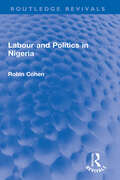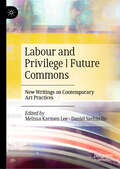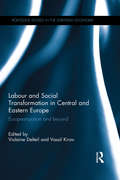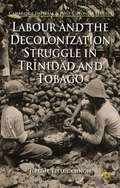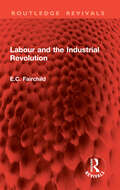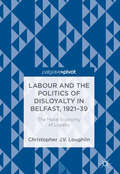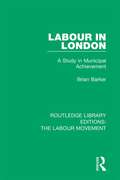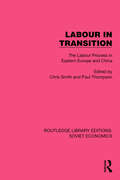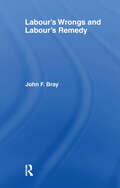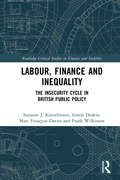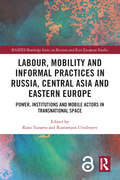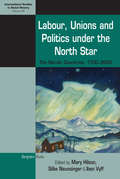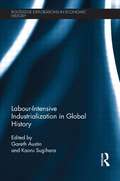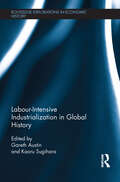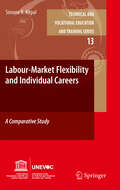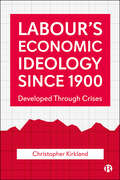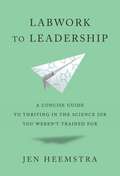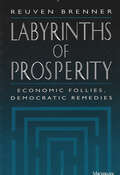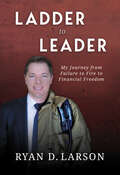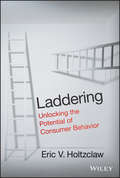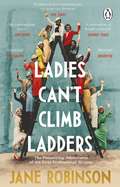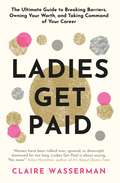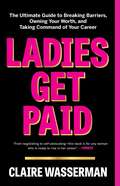- Table View
- List View
Labour and Politics in Nigeria (Routledge Revivals)
by Robin CohenOriginally published in 1974 and with a new introduction for the 1981 edition, this book is a clear and vivid history of the role of organized labour in the politics of Nigeria. It covers the period from the first General Strike of 1945 to the civil war and reintegration of the country. As well as providing an analysis of the characteristics and attitudes of Nigeria’s wage earners, this study is concerned with their place in the wider political and social life of the country. The attempts of the trade unions to create a representative central labour organisation are considered, as is the internal structure of the unions themselves. The book also examines the relationship of the Unions with the political parties of the first Republic and later with the Military Government. The influence of the trade unions in the determination of wage rates is analysed. The book concludes with an overview of trade unions in other parts of Africa with which the performance and characteristics of organized labour in Nigeria are compared
Labour and Privilege | Future Commons: New Writings on Contemporary Art Practices
by Melissa Karmen Lee Daniel Szehin HoThis book project was part of an annual series of Summer seminars held at Hong Kong's Tai Kwun Centre for Heritage and Arts, which brought the intellectual community together to debate the social issues of the day. The artists, writers, and scholars included in these texts represent unconventional thinkers completing rigorous scholarship that we think is important to be published today, as Hong Kong seeks for social and political alternatives. This book will be of interest to public intellectuals, political/cultural theorists and thinkers, as well as the international art community.
Labour and Social Transformation in Central and Eastern Europe: Europeanization and beyond (Routledge Studies in the European Economy)
by Violaine Delteil and Vassil KirovOver a quarter of a century after the fall of the Berlin Wall and 10 years after their accession to the European Union (EU), Central and Eastern Europe Countries (CEECs) still show marked differences with the rest of Europe in the fields of labour, work and industrial relations. This book presents a detailed and original analysis of labour and social transformations in the CEECs. By examining a wide range of countries in Central Europe, Labour and Social Transformation in Central and Eastern Europe offers a comprehensive and contrasting view of labour developments in Central and Eastern Europe. Chapters explore three related issues. The first deals with the understanding of the complex process of Europeanization applied in the sphere of labour, employment and industrial relations. The second issue refers to the attempt to link the Europeanization approach with an analysis mobilizing the theoretical concept of "dependent capitalism(s)". The third issue refers to the cumulative trends of labour weakening and labour awakening that has emerged, in particular in the aftermath of the crisis beginning in 2007-2008. This book will be of interest to academics, policy makers and stakeholders at European and national level in the EU member states.
Labour and the Decolonization Struggle in Trinidad and Tobago
by Jerome TeelucksinghThis book provides evidence that Labour in Trinidad and Tobago played a vital role in undermining British colonialism and advocating for federation and self-government. Furthermore, there is emphasis on the pioneering efforts of the Labour movement in party politics, social justice, and working class solidarity.
Labour and the Industrial Revolution (Routledge Revivals)
by E.C. FairchildFirst published in 1923, Labour and the Industrial Revolution is an examination of opinions (1760–1832) on the right place of wage-earner under the State. The idealism of the labourer is attributed to the conditions caused by mechanical devices, which, on their introduction, tend to destroy his individuality. The author treats of the machine as the groundwork of economic and ethical theory and of the modern Labour movement. This book will be of interest to students and researchers of economic history.
Labour and the Politics of Disloyalty in Belfast, 1921-39: The Moral Economy of Loyalty
by Christopher J. V. LoughlinThis book provides the first ‘history from below’ of the inter-war Belfast labour movement. It is a social history of the politics of Belfast labour and applies methodology from history, sociology and political science. Christopher J. V. Loughlin questions previous narratives that asserted the centrality of religion and sectarian conflict in the establishment of Northern Ireland. Labour and the Politics of Disloyalty in Belfast, 1921-39 suggests that political division and violence were key to the foundation and maintenance of the democratic ancien régime in Northern Ireland. It examines the relationship between Belfast Labour, sectarianism, electoral politics, security and industrial relations policy, and women’s politics in the city.
Labour in London: A Study in Municipal Achievement (Routledge Library Editions: The Labour Movement #1)
by Brian BarkerFirst published in 1946. This title is a clear and concise account of the march of Labour to the control of the London County Council and its work at County Hall in the 1940s. This study explores the rise of the Labour Party in London and the changes and progress in health, education, and social welfare. Labour in London will be of interest to students of history and politics.
Labour in Transition: The Labour Process in Eastern Europe and China (Routledge Library Editions: Soviet Economics #9)
by Paul Thompson Chris SmithLabour in Transition (1992) examines the massive transformations undertaken by state socialist regimes at the end of the 1980s. It traces developments in the Soviet Union, Eastern Europe and China, in particular the impact of changes in the labour process and broader political economy. Detailed empirical analysis of reform processes is effectively combined with a broader comparative examination of capitalism, socialism and the process of transition to new social formations.
Labour's Wrongs and Labour's Remedy: Or, The Age Of Might And The Age Of Right (Reprints Of Economic Classics Ser.)
by John F. BrayFirst Published in 1969. Routledge is an imprint of Taylor & Francis, an informa company.
Labour, Finance and Inequality: The Insecurity Cycle in British Public Policy (Routledge Critical Studies in Finance and Stability)
by Frank Wilkinson Simon Deakin Suzanne J. Konzelmann Marc Fovargue-DaviesFollowing the 2008 "global" financial crisis, the viability of globalised financial capitalism was called into question. The resulting fear and uncertainty produced a momentary return to "Keynesian" policies. But as soon as emergency stimuli – and bank bail-outs – appeared to stabilise the situation, there was a sharp reversal; and successive British governments and the financial sector have since attempted to return to business as usual. Historically, much smaller shocks have been able to produce dramatic change, with the 1978 "Winter of Discontent" providing a catalyst for the election of Margaret Thatcher, the ultimate abandonment of the post-war Keynesian consensus, and the ushering-in of neoliberalism. Nor is apparent success a guarantee against change, with Winston Churchill being swept from office by the first majority Labour government in 1945 – at a point which should have marked his greatest triumph. In this book, these apparently inexplicable shifts in the conventional wisdom and the accompanying policy paradigm are explored through the lens of the interest groups that have jostled for position since the second industrial revolution. In this context, inequality, poverty, free market capitalism and the social welfare state have interacted in an uneasy, dynamic dance – the "insecurity cycle". The authors explore these interactions, their impact on the relationship between society and the economy, and the possible implications of Brexit and a re-energised political left. Written in an engaging and accessible style, Labour, Finance and Inequality will be a key resource for academics and students of social and political economics as well as public policy. It will also offer considerable insight to policy makers and a more general non-specialist audience.
Labour, Mobility and Informal Practices in Russia, Central Asia and Eastern Europe: Power, Institutions and Mobile Actors in Transnational Space (ISSN)
by Rano Turaeva Rustamjon UrinboyevThis book explores the daily survival strategies of people within the context of failed states, flourishing informal economies, legal uncertainty, increased mobility, and globalization, where many people, who are forced by the circumstances to be innovative and transnational, have found their niches outside formal processes and structures. The book provides a thorough theoretical introduction to the link between labour mobility and informality and comprises convincing case studies from a wide range of post-socialist countries. Overall, it highlights the importance of trust, transnational networks, and digital technologies in settings where the rules governing economic and social activities of mobile workers are often unclear and flexible.
Labour, Unions and Politics under the North Star: The Nordic Countries, 1700-2000 (International Studies in Social History #28)
by Mary Hilson Silke Neunsinger Iben VyffDenmark, Finland, Iceland, Norway, and Sweden today all enjoy a reputation for strong labour movements, which in turn are widely seen as part of a distinctive regional approach to politics, collective bargaining and welfare. But as this volume demonstrates, narratives of the so-called “Nordic model” can obscure the fact that experiences of work and the fortunes of organized labour have varied widely throughout the region and across different historical periods. Together, the essays collected here represent an ambitious intervention in labour historiography and European history, exploring themes such as work, unions, politics and migration from the early modern period to the twenty-first century.
Labour-Intensive Industrialization in Global History
by Gareth Austin Kaoru Sugihara<p>The prevailing view of industrialization has focussed on technology, capital, entrepreneurship and the institutions that enabled them to be deployed. Labour was often equated with other factors of production, and assigned a relatively passive role. Yet it was labour absorption and the improvement of the quality of labour over the course of several centuries that underscored the timing, pace and quality of global industrialization. <p>While science and technology developed in the West and whereas the use of fossil fuels, especially coal and oil, were vital to this process, the more recent history has been underpinned by the development of comparatively resource- and energy-saving technology, without which the diffusion of industrialization would not have been possible. <p>The labour-intensive, resource-saving path, which emerged in East Asia under the influence of Western technology and institutions, and is diffusing across the world, suggests the most realistic route humans could take for a further diffusion of industrialization, which might respond to the rising expectations of living standards without catastrophic environmental degradation.</p>
Labour-Intensive Industrialization in Global History (Routledge Explorations in Economic History #59)
by Gareth Austin Kaoru SugiharaThe prevailing view of industrialization has focussed on technology, capital, entrepreneurship and the institutions that enabled them to be deployed. Labour was often equated with other factors of production, and assigned a relatively passive role. Yet it was labour absorption and the improvement of the quality of labour over the course of several centuries that underscored the timing, pace and quality of global industrialization. While science and technology developed in the West and whereas the use of fossil fuels, especially coal and oil, were vital to this process, the more recent history has been underpinned by the development of comparatively resource- and energy-saving technology, without which the diffusion of industrialization would not have been possible. The labour-intensive, resource-saving path, which emerged in East Asia under the influence of Western technology and institutions, and is diffusing across the world, suggests the most realistic route humans could take for a further diffusion of industrialization, which might respond to the rising expectations of living standards without catastrophic environmental degradation.
Labour-Market Flexibility and Individual Careers
by Simone R. KirpalWith labour markets across the world and even in social democratic Europe in a state of unprecedented flux, this exhaustive study addresses the problem of how to balance job market demands, personal career interests and private life becomes a central issue for millions of employees. So how do modern work and employment arrangements restructure individual careers and what is required of individuals in order to manage career transitions successfully over time? This is one of very few in-depth empirical studies to analyze how labour market trends, organisational change and the subjective work orientations of individuals interact. The author's detailed assessment is based on a comparison of the structural contexts, work orientations and employment histories of nurses and ICT technicians in Germany and the UK. These two core service occupations, as well as the national contexts of the two European nations, have quite different working environments and vocational traditions. Nursing is an institutionalized semi-profession with clear criteria of qualification and career continuity, while information and communication technology (ICT) is a new, evolving field with varied skill backgrounds and high job mobility. To arrive at an understanding of how individual career trajectories are changing, this book closely examines the interplay of labour market demands, employees' work and career orientations and the development of their skills. It records the ways in which employees adapt to increased labour market flexibility, which, on the one hand, induces discontinuities of careers, employment and work, and on the other, generates new skill requirements and learning expectations, as well as unforeseen opportunities.
Labour’s Economic Ideology Since 1900: Developed Through Crises
by Christopher KirklandThis book traces the economic ideology of the UK Labour Party from its origins to the current day. Through its analysis, the book emphasises key crises, including the 1926 General Strike, the 1931 Great Depression, the 1979 Winter of Discontent and the 2007/2008 economic crisis. In analysing this history, the ideology of the Labour Party is examined through four core themes: • the party’s definition of socialism; • the role of the state in economic decision making; • the party’s understanding of inequalities; and • its relationship with the trade union movement. The result is a systematic exploration of the drivers and key ideas behind the Labour Party’s economic ideology. In demonstrating how crises have affected the party’s economic policy, the book presents a historical analysis of the party’s evolution since its formation and offers insights into how future changes may occur.
Labuan, Malaysia: Assessment of the Supervision and Regulation of the Financial Sector--Review of Financial Sector Regulation and Supervision
by International Monetary FundA report from the International Monetary Fund.
Labwork to Leadership: A Concise Guide to Thriving in the Science Job You Weren’t Trained For
by Jen HeemstraA roadmap for running a lab—and developing the leadership skills you didn’t know you needed.As a graduate student and postdoctoral researcher, chemist Jen Heemstra learned how to collect data, write papers, and give talks to other scientists. But when, just a few years into her first job as a principal investigator, conflict broke out in the lab, she realized there was one skill she hadn’t learned: leadership.Labwork to Leadership is the book that every PI needs. Drawing on her decades of experience—including plenty of trial and error—as well as research from psychology and business management, Heemstra nimbly guides readers through the essentials of scientific leadership. From fostering an inclusive lab environment to setting effective goals and learning to give and receive feedback graciously, she uncovers the curriculum successful PIs must follow to motivate lab members, communicate key values, and inspire confidence.With candor and humility, Labwork to Leadership demystifies the critical leadership skills that too many universities fail to teach. And it shows how teaching scientists to lead can boost productivity, spur innovation, and, above all, help research teams rediscover the joy of science.
Labyrinth: An Essay on the Political Psychology of Change
by R.E. WilsonTo receive tenure, college and university professors have long been required to write scholarly monographs or articles, engage in serious research and teach effectively. This collection of articles marks the first effort to evaluate the place of digital scholarship in this process.
Labyrinths of Prosperity: Economic Follies, Democratic Remedies
by Reuven BrennerLabyrinths of Prosperity: Economic Follies, Democratic Remedies by Reuven Brenner explores the cyclical shifts in economic thought, specifically focusing on the myths of macroeconomics and their impact on policy-making and prosperity. Brenner questions the scientific legitimacy of macroeconomic theories, highlighting their contradictions and the misleading confidence with which they are presented. He critiques the use of national statistics and macroeconomic aggregates—such as the GDP and unemployment rates—as unreliable bases for policy-making due to their frequent revisions and inherent inaccuracies. The book argues that true prosperity emanates from trade and financial practices that allow individuals to take risks and leverage opportunities, rather than from macroeconomic policies that claim to fine-tune economies around aggregated statistics. Brenner suggests that public policy should shift towards fostering environments where entrepreneurial endeavors can thrive, through mechanisms such as referenda and direct political engagement, to prevent policy errors from persisting unchallenged. By advocating for decentralization, Brenner assigns the responsibility of curbing government excess and sustaining prosperity to the ingenuity and innovation of individuals, thus promoting a political climate that encourages adaptation and economic freedom over rigid statutory prescriptions.
Ladder to Leader: My Journey From Failure to Fire to Financial Freedom
by Ryan D LarsonLadder to Leader: My Journey From Failure to Fire to Financial Freedom is a memoir by Ryan D. Larson, the principal Investment Advisor Representative and Founder of FirstLine Financial, LLC. Founded in 2015, FirstLine Financial earned a Service Mark from the US Patent office for the company's intake process in 2020, only five years later. Larson credits his time in the Phoenix Fire and other Arizona Fire Departments for teaching him organization and planning skills that inspired FirstLine Financial's intake process. In the second half of the book, Larson introduces financial terms and products, describing them using terminology and giving examples that make them simple to understand. The book is interesting from a memoir perspective and shares information, including case studies, to explain the financial investing terminology clearly and concisely.Larson shares childhood struggles which lead to his failures and frustrations as a high school graduate. He tells stories about feeling like an outsider at home because of not being close to his three siblings and the impact his father's time away in the military affected him. Married young, the family always lived near his mother's parents. His father joined the army, and his mother worked part-time to help make ends meet. Larson's grandparents took care of the children often and were very important to the author, especially when his father deployed during his pivotal middle school years. Always active and very athletic, Larson became a local Pop Warner Football hero. His father, when not deployed, was an assistant coach and very involved with the author's athletics. Both father and son saw a future for Larson in professional football, which came to an end in middle school. However, Larson struggled academically and his parents wanted him to “just graduate and get a job,” especially when his dreams of a pro-football career faded. All of this affected the author's self-confidence. After graduation from high school, Larson was lost, became depressed, and floated from job to job, never feeling fulfilled or seeing a future for himself. A twist of fate, which his mother calls ‘divine inspiration,' led Larson to the Fire Department Explorer Program, which fueled his interest in becoming a firefighter. The competition is fierce for the very few fire department job openings, requiring passing a rigorous suitability/entrance exam. Larson studied several hours a day to prepare and failed the exam at least three times, but his score was better each time. This process made him realize that he is smart and, if he sets his mind to the task, he can accomplish anything. The fire department exam includes sections on reading comprehension and math, which the author was terrified of. The confidence he gained from this process carried him through the many challenges he had yet to face.Once employed as a firefighter, Larson quickly became a valued member of the department. During his days off, he began taking stock market trading classes after watching the movie Wall Street. As part of the course, students bought and sold stocks, learned how to chart them, and did things that would have once scared Larson. As he began making money, fellow firefighters took an interest in his new passion. Before long, he was discussing their finances and giving investment advice. With encouragement from his wife and friends at the station, Larson began working for financial advisors. He eventually earned his Independent Retirement Adviser credentials and opening his own Registered Investment Advisory Firm, FirstLine Financial.
Laddering
by Eric V. HoltzclawMarketing and product development best practices for a fragmented economyThe rules for marketing and product development have changed forever. You no longer control where and how consumers receive marketing messages. The consumer is in charge, with ever-growing choices and a shrinking decision window. Therefore, it is crucial to understand what drives customer behavior to design products, marketing, and experiences that will succeed. Laddering explains how to better understand your customers' core values. Learn to ask the right questions from your customers, use it to analyze your data, and unlock the true potential of your product or service. Use Laddering techniques to map your customer's DNA and understand why consumers buy from you. Helps you look at your customers in a new way and as a result maximize your profits and reduce your support costs Provides a framework for evaluating what marketing messages, campaigns and experiences are appropriate Author Eric V. Holtzclaw is CEO and founder of User Insight, a user experience research firm and Laddering Works, a marketing strategy and consulting firm. His weekly radio show, The 'Better You' Project, shines a spotlight on entrepreneurs' business journeys, his column Lean Forward appears weekly on INC.com and he is regularly contributor to CMO.com.You must understand what is truly important in order to build relationships with consumers and to market for success in the new many-to-many economy. Laddering offers the tools and knowledge you need to thrive.
Ladies Can’t Climb Ladders: The Pioneering Adventures of the First Professional Women
by Jane RobinsonIt is a myth that either of the World Wars liberated women.The Sex Disqualification (Removal) Act of 1919 was one of the most significant pieces of legislation in modern Britain. It marked at once political watershed and a social revolution; the point at which women of 21 and over were recognised in law as being as competent as men. But were they? What actually happened when this bill was passed? This is the story of what happened next.Ladies Can't Climb Ladders focuses on the lives of six women - six pioneers - forging paths in the fields of medicine, law, academia, architecture, engineering and the church. Robinson's startling study into the public and private lives of these women sheds light not on the desires and ambitions of her subjects but how family and society responded to the working woman and what their legacy looks like today. This book is written in their honour. It is a book about live subjects: equal opportunity, the gender pay gap, and whether women can expect, or indeed deserve, to have it at all.'An important and crackingly good read.' - Telegraph
Ladies Get Paid: The Ultimate Guide To Breaking Barriers, Owning Your Worth, And Taking Command Of Your Career
by Claire WassermanWritten by career coach and founder of career development organisation Ladies Get Paid, Claire Wasserman provides the tools and talking points women can use to successfully navigate gender power dynamics in the workplace. The goal? Rise up and get paid.
Ladies Get Paid: The Ultimate Guide to Breaking Barriers, Owning Your Worth, and Taking Command of Your Career
by Claire WassermanFrom career coach and founder of the startup Ladies Get Paid—the eponymous organization leading the fight for equality in the workplace—comes an empowering guide to provide you with the tools to strategically navigate the workplace, achieve success, and become a true leader. Claire Wasserman has one goal for women: Rise up and get paid. As the founder of Ladies Get Paid, Claire has worked her entire adult life to promote gender equality in the workplace. If you&’re looking to navigate a promotion or break the glass ceiling, Ladies Get Paid is your essential toolkit for achieving success. Filled with straightforward advice and inspiring stories, Ladies Get Paid encourages self-advocacy and activism as a way to advance your career and make more money. Covering topics as crucial and varied as how to find the perfect mentor, how to negotiate a raise, and how to become a leader, Ladies Get Paid is a reminder that you are valuable—both as an individual woman and as part of the female community. And ultimately, it&’s about more than your wallet—it&’s about your worth.
